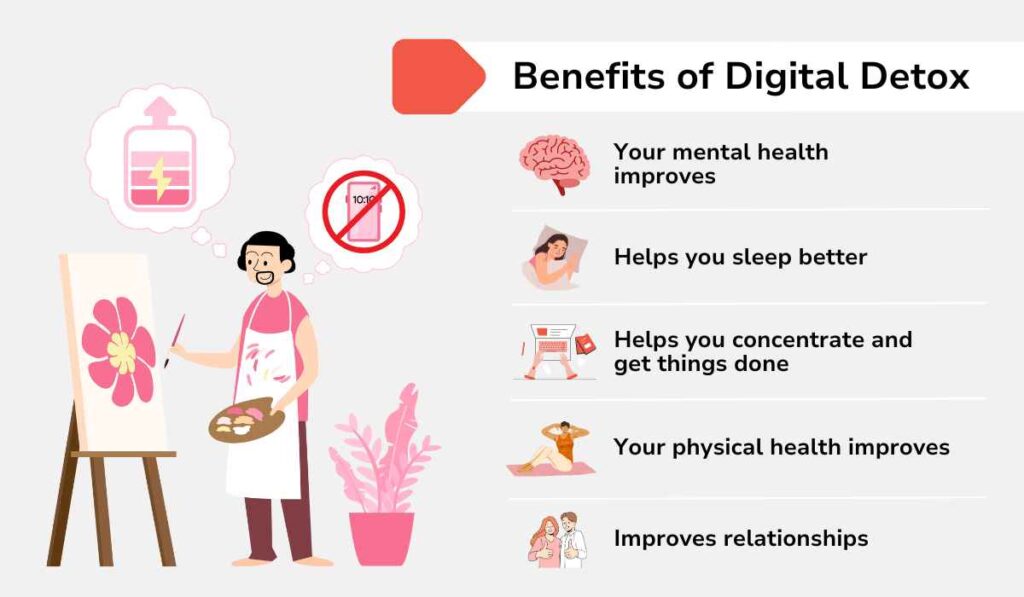Digital Detox: Meaning, Benefits, and Why You Need It

You might find yourself constantly plugged to your devices. The endless scrolling and juggling between various apps has become the most common way to pass time. Let’s face it, in today’s complex web of digital world, the pressure to stay updated is real. Due to this, the benefits of digital detox have gained tremendous importance.
A recent study by RescueTime found that people spend an average 6 hours and 58 minutes of screen time per day globally. We reach for our phones the first thing when we wake up and scroll through it before sleeping at night. This takes a significant amount of time of our day.
Ask yourself: Do you remember what you did before mobiles and laptops became an extension of yourself? The answer is probably no. While there is no doubt that these technologies have offered numerous benefits, their negative impacts often go unnoticed.
The way we are constantly glued to our devices can have a negative impact on our physical and mental well-being. This increases the risk of mental health problems in the long run.
If this sounds like your everyday story, you might be in need of a digital detox.
Let’s take a deeper look into what a digital detox is, its benefits, and why you might need one.
What is a Digital Detox?
A digital detox is a brief period of time when someone refrains from using computers, smart phones, and social networking sites.
During this detox, you mindfully reduce your screen time, disconnect from the digital world and reconnect with the real world. By doing this, you reduce the exposure of content and notifications, which helps reduce stress and improve overall well-being.

What are the 5 Benefits of a Digital Detox?
Does digital detox work? A digital detox can help you in more ways than you can imagine. Heavy usage of smartphones can affect your brain. There is growing research that supports the positive impact of a digital detox
Here are some of the benefits of doing a digital detox:
1. Your mental health improves
Social Media takes a huge psychological toll on your mind.
Research has shown that constant connectivity and the pressure to keep up with social networks can negatively impact mental health.
The things you see on social media can change how you see your own life. When you look at other people’s accounts, it’s easy to start comparing your life to theirs. This can make you feel bad about yourself and have a bad effect on your mental health.
Moreover, constant notifications and alerts from endless apps can be overwhelming, leading to stress and anxiety.
A digital detox can help lower stress and anxiety, which is good for your mental health in general.
2. Helps you sleep better
Your body works on a clock. It knows when it’s sleep time and signals the brain to release melatonin – a hormone that regulates sleep.
The blue light emitted by electronic devices disrupts the production of this sleep hormone.
Because your brain is active and alert while looking at a screen, the brain delays the release of melatonin. That’s why exposure to blue light from screens before bedtime can disrupt sleep patterns.
A digital detox, especially in the evening, can lead to better sleep quality and reduced sleep disruption.
A study found that participants who reduced their evening screen time for a week reported better sleep quality, falling asleep faster and waking up feeling more refreshed.
3. Helps you concentrate and get things done
We all waste a lot of time going from one device or app to another.
The digital world is time-consuming. Scrolling and switching between apps makes it easy to get lost and not realise how much time you’ve wasted. One can also get easily distracted with the frequent alerts and notifications popping up.
During a digital detox, you may find your brain more alert which can help you focus and get things done.
Studies show that using technology to do more than one thing at once can make you less productive and increase the time needed to complete tasks.
4. Your physical health improves
Excessive use of digital devices is linked to sedentary behaviour, which can lead to various health issues. A digital detox encourages physical activity, reducing the risk of conditions such as obesity and cardiovascular diseases.
Excessive screen time can also cause eye strain, headaches, and blurred vision. Taking a break from digital devices allows your eyes to rest and recover, leading to improved visual comfort.
Spending long hours on devices may also cause back and neck problems that can permanently affect your posture.
5. Improves relationships
When you spend less time on your devices, you have more chance to meet with people in real life. You pay more attention to the people, conversations and things going on around you.
Less time spent on screens and more time spent with others can make relationships stronger both personally and professionally.
A digital detox lets you be more present in conversation, connect with people more deeply, and listen more deeply when you don’t have your phone with you. It helps you get to know other people and build interpersonal relationships
Signs You Need a Digital Detox
- You feel the constant need to check your phone
- You feel the constant need to keep checking emails and refreshing your inbox.
- You find yourself using your phone first thing in the morning and last thing at night
- You Feel anxious or stressed when away from devices
- You compare your life to what you see on social media
- You use your phone as a distraction to avoid unpleasant situations.
- Trying to do too many things at once makes you jump from one to another without finishing any of them.
- You get headaches, neck pain, or eye strain from spending too much time in front of a computer.
- Because you’re always connected digitally, it’s hard to set boundaries between job and personal life.
How Does Digital Detox Improve Mental Health?
A digital detox can significantly improve your mental well-being in several ways.
I found myself visibly less stressed once I stopped opening Instagram during my work hours. The constant need to see what’s on your feed eventually goes away making you feel lighter and more mentally available.

Here are some reasons to do a digital detox
- Less Anxiety and Stress: Too much information can be stressful. Limiting the time spent on social media can help you destress. A 2018 study published in Computers in Human Behavior showed that participants who took a digital detox experienced significant reductions in symptoms of anxiety and depression.
- Better Sleep: As mentioned earlier, a digital detox can lead to better sleep quality, which is directly linked to improved mood and reduced stress levels. A digital detox can help your brain have a better control over your sleep cycle resulting in good quality sleep and improved mood. Along with these, a digital detox can have numerous other health benefits as well.
- Feel Better About Yourself: It is natural sometimes to compare ourselves with others on social media. Taking a break from social media comparisons can help improve your self-esteem and body image.
- More Mindful: Your brain has so much more time when it’s not spending time on devices. A digital detox allows you to be more present in the moment. Without the distractions of technology, you can be more present and mindful in your daily life.
- Better Work-Life Balance: You automatically have more time for other things. A digital detox can help you set boundaries between work and personal time and maintain a healthier work-life balance. Research shows that a digital detox can improve your ability to focus on tasks and reduce symptoms of ADHD [Attention Deficit Hyperactivity Disorder]
How to Do a Digital Detox
For me, going cold-turkey was not realistic. So, I tried to take baby-steps. Just reducing my usage for 2 hours after waking up and 2 hours before sleeping made a huge impact. During the day as well, I tried to set boundaries first by identifying consciously when I was mindlessly scrolling. This helped me reduce my screen time and I was still able to enjoy the benefits of digital detox.
These a are a few things that helped me:
1. Define a Goal
Set a goal for what you want to achieve with your digital detox. Identify what you would like to reduce or eliminate: start with a particular device or a specific app.
After this, determine the duration of your detox.
2. Establish Boundaries
It takes time to change a habit. Make a short plan and stick to it. You can do this by keeping your phone at the other end of the room for an hour, by turning all the notifications off or even setting specific times to avoid the use of devices.
Consider going on a ‘Digital Detox Challenge’ or a ‘No Phone Challenge’ – this involves using your phone as little as possible without sacrificing its real utility.
3. Remove Distractions
When you declutter your devices, you remove apps you know are useless. I downloaded Snapchat in college and I still have it installed on my phone. I NEVER use that App, however when I receive an In-App notification, I always open the App and spend at least 10 minutes on it without any purpose.
Using digital detox tools can be helpful in such cases. There are various apps and tools designed to help manage screen time and reduce digital distractions. Utilise these tools to monitor and limit your device usage.
4. Pursue Hobbies
To successfully follow a digital detox, you need to find what fills the void that technology left behind. Try indulging in offline activities you genuinely enjoy that don’t involve screens, such as reading a book, going for a walk, or pursuing a hobby.
5. Inform Others
It’s always better when you have the support of people you’re surrounded by everyday. You can let your friends, family and colleagues know about your digital detox and limited availability. This will help you stay accountable and encouraged.
6. Track your Progress
Reflect on your digital detox experience. Check-in with yourself after a few days of your digital detox to analyse what is and is not working for you.
Be open to adjust your goals on-the-go as needed to ensure they continue to meet your needs and improve your well-being.
For example, if you’re spending more time on WhatsApp now that you’re off Instagram, you may need to consider shutting off your phone entirely.
7. Make It Your Lifestyle
Evaluate how the digital detox benefitted you. What happened when you stopped scrolling? How did you feel when you were off your device? Reflect and decide what you want to incorporate in your daily life permanently. For example, making it a rule that you will not touch your phone for at least an hour right after waking up.
By following these steps and evaluating what works and doesn’t work for you, you can successfully execute and enjoy the benefits of digital detox for your mental and physical well-being.
In this hyper-connected world of technology, it’s clear that taking a break from devices is good for your well-being and the importance of digital detox is significant.
Digital detox is a big part of improving your quality of life. It can help your mental health, help you sleep better, and make you more productive.
You can live a better, more balanced life if you know the signs that you need a digital detox and take the steps to make it happen. Take on the task, go device-free and see how a withdrawal from technology can improve your life.






